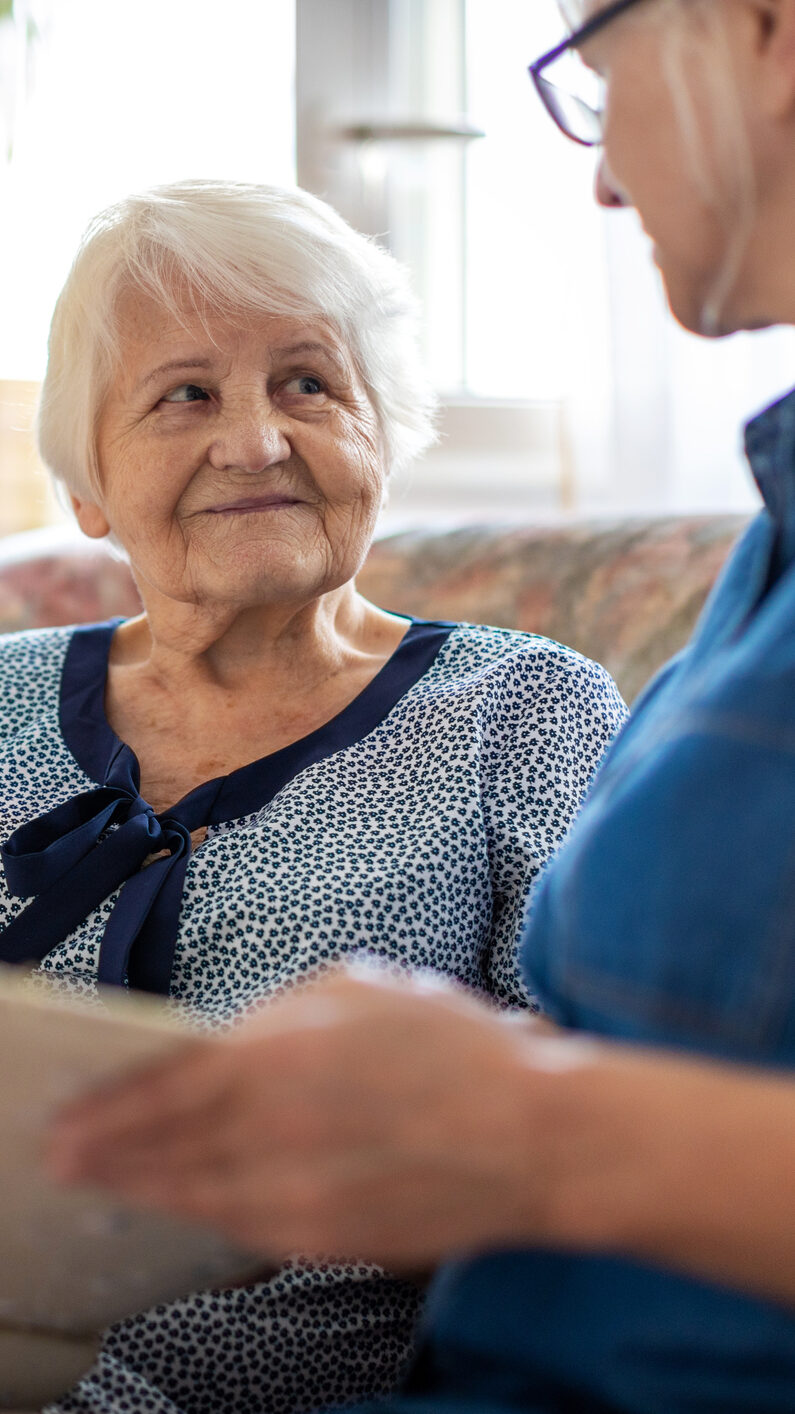After a hospitalization for a serious health event, many seniors will need additional care or rehabilitation services, such as physical or occupational therapy, until they have fully recovered. We understand finding the right senior care after a hospitalization can be difficult to navigate.
After hospitalization, seniors receive necessary short-term services when sent to a skilled nursing facility or rehabilitation center. Seniors will be sent home if rehab or continued intensive medical care isn’t required. This is despite still requiring assistance with daily activities such as bathing and preparing meals or needing nursing care such as wound dressing. The burden of securing all of the necessary services and assistance most often falls on the family.
A recent study showed that after a hospitalization nearly 15% of seniors return to the hospital within 30 days. The safety of the environment in which a senior recuperates and the quality of oversight they receive will play a critical role in their overall well being, and yet many families are not aware of the various available options.
Post-Hospitalization Considerations
We all want our loved ones to regain their independence as quickly as possible and to minimize any chance of re-hospitalizations. As a family member, taking charge in help making the right decision about where your loved one recuperates is a responsibility. You will know best about their history, personal preferences, and your family’s ability to assist in caregiving. When deciding, it will be essential to consider hospital recommendations, what your loved one would want, and how they feel. For example, the hospital can recommend your loved one release to their home. Yet, you know they do not feel confident or strong enough to handle being alone. Talk about this with the discharge planner. While rehabilitation starts in a hospital, your loved one can complete it in an assisted living community, rehabilitation center, or a skilled nursing facility (SNF). Discuss all options and preferences with your loved one’s discharge team.
Families who have never gone through a major hospitalization or recovery before may feel overwhelmed by the options and may not fully understand what each choice could entail. Understanding the terminology and service offerings can help families to make the best decisions. Here are a few common scenarios to consider.
Short-term Respite Stays at an Assisted Living Community

Probably the most underused yet very effective transition to home after a serious hospital stay is the assisted living option. That is to say, an interim short-term respite stay in an assisted living community, which bridges the gap between hospital and home, can provide the extra care, support and time one needs to fully recuperate. In addition, it gives families the time they need to organize post-hospital care so that their loved one returns to a safe environment with all the right supports in place.
In short, a respite stay at an assisted living community comforts families. Therefore, it brings comfort to families to know that their loved one’s needs being met and well-coordinated. Likewise, they have the time they need to make well-informed decisions. For instance, these decisions include post-rehab or post-hospital care without being under time constraints or pressure.
Going Home and Bringing in Home Care or Other Health Services
Your loved one may not necessarily be sick and therefore does not require the 24-hour care of a skilled nursing facility. They are either already rehabilitated or do not require rehab services. So they are being released to their home, or you are planning to bring in rehabilitation services to their home. Here’s what you need to know:
- You can bring therapy services into the home, rather than going to a rehab facility, but that may not always be the best choice. Successful therapy requires the person who is rehabilitating to complete parts of their therapies, such as an exercise regimen, when the therapist is not around. Sometimes this can be difficult when recovering at home or alone. In an Assisted Living community or SNF your loved one will have the extra motivation and security that comes with peer support and 24-hour oversight.
- When recovering at home, there may be extra responsibilities for family members or caregivers… This can be difficult if family does not live nearby. Is your family equipped and/or available to help in providing personal care? household care? medication assistance? What about socialization? This is a key component to a successful recovery.
- … Or you may need to bring in hired help. The help that you bring in may be partly decided by whether or not the service is deemed “medically necessary.” Do keep in mind that there is a difference between medical and non-medical home services and they may not all be covered by Medicare or insurance. “Home care” or non-medical services will include personal care such as bathing, dressing, meal preparation, housekeeping, shopping, assistance with self-administered medications, ambulation, exercises, and/ or transportation to medical appointments. “Home Health Care” is generally medical services including nursing care, physical, occupational, speech, and respiratory therapy, social services and hospice care.

Recovering at a Rehabilitation Center or Skilled Nursing Facility
Your loved one needs rehabilitative and/or skilled medical care and the discharge planning team has handed you a list of nearby facilities and is asking you to choose. You are already feeling stressed and now you have little time and very little information on which to base an important decision. Here’s what you need to know:
- Skilled nursing facilities (SNFs) or nursing homes, rehabilitation hospitals or centers, best suit seniors with complex medical needs requiring 24-hour nursing services. The environment at a SNF can tend to feel like a hospital.
- Post hospitalization, short-term rehabilitation stays at a SNF may be covered by Medicare, for up to 100 days. Medicare or other insurance don’t cover all post-hospitalization care. Check directly with the hospital, your insurer and/or Medicare to find out details on insurance coverage.
- Your loved may need a longer recovery time and yet they may not meet the medical requirements of a long-term stay at a SNF. If a more permanent supportive living arrangement is necessary, you may consider an assisted living community.
Here’s what you need to know:
- Just like being discharged to their home, your loved one can bring in rehabilitative services. Paid for by Medicare, specific therapies and medically required nursing services are provided.
- Seniors still recuperating and regaining their strength can receive personal care services, proper nutrition, and help managing medications. Moreover, there is access to 24-hour care staff in a home-like setting. There are other benefits in living at a supportive assisted living community including socialization and avoiding hospital re-admission.
- Your loved one can enjoy a comfortable fully furnished apartment or personalize their living space by bringing in their own furnishings. Care is provided discreetly in the privacy of their own apartment.
- Most assisted living communities offer a bustling daily calendar. Programs include adult learning, arts, music, wellness, recreation, and relaxation. It gives residents, including those who stay short-term, opportunities to build relationships with peers. Enjoying Camaraderie, laughter, and being actively engaging in activities help foster well-being and improve recuperation.
- A typical post hospitalization short-term stay is around two months. However, sometimes it can be less. Check with the assisted living community about whether there is a minimum stay requirement.
- You may also want to consider a respite stay at assisted living. For instance, your loved one does not need medical care or therapy but is not independent enough to go home alone. This is an option for you or other family members who cannot assist with providing care at home.
- Your loved one has an opportunity to stay at a senior living community to see what is a good fit for them. Certainly, this makes transition to permanent residency, if necessary, easier. Most assisted living communities provide additional care options. This includes memory support environments for those with Alzheimer’s or dementia, allowing your loved one to age well in place.
Basic Questions to Help Determine the Right Place to Recover
Ask these questions to help determine the appropriate environment for your loved one:

- What medical follow-up is necessary?
- Which types of therapies will be required?
- Any medical or safety equipment needed?
- Which types of medications are they taking and what are the dosages/side effects?
- What symptoms, medication side effects or other related medical issues should we watch for?
- What level of care assistance will they need?
- Are there any special training I or a caregiver will need for things such as changing dressings, giving injections or using equipment?
- Is my loved one safe at home or do they need 24-hour care?
- Do they need assistance with bathing, dressing or toileting?
- Will they need help moving around, climbing stairs or getting from a chair to a bed?
- Is there a need for assistance with meal prep or doing housework?
- Will they need medication reminders?
- What will health insurance or Medicare help pay for?
- Who do we call for emergencies, problems or questions on medical equipment?
- What is the average length of recovery time?


 Tadd Clelland
Tadd Clelland